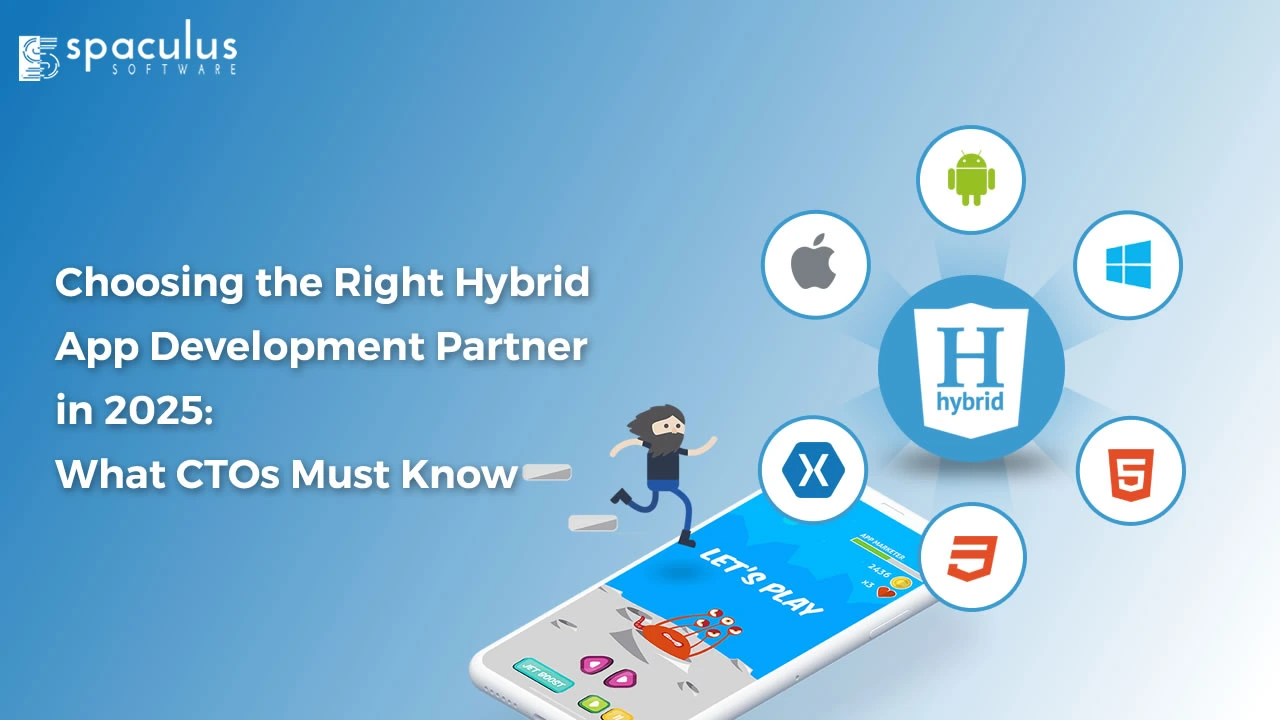
You’re likely considering a hybrid tech stack.
And for good reason — hybrid apps today are faster to build, more cost-effective, and increasingly powerful. But here’s the real challenge:
Choosing the right Hybrid App Development Company.
This decision will directly impact your app’s:
If you’re a CTO, product head, or founder planning a mobile app, this guide covers everything you need to know to select the right hybrid app partner in 2025.
Hybrid apps are built using web technologies (HTML, CSS, JavaScript) and run inside a native shell. They work on both iOS and Android — all from a single codebase.
Popular hybrid frameworks in 2025:
Unlike native development (which requires separate builds for Android and iOS), hybrid frameworks save time, cost, and ongoing effort — while delivering 90–95% of the same user experience.
In 2025, hybrid is no longer a compromise. It’s a strategic technology choice for most businesses aiming for speed, cost-efficiency, and feature flexibility.
Here’s why more tech leaders are leaning toward hybrid frameworks:
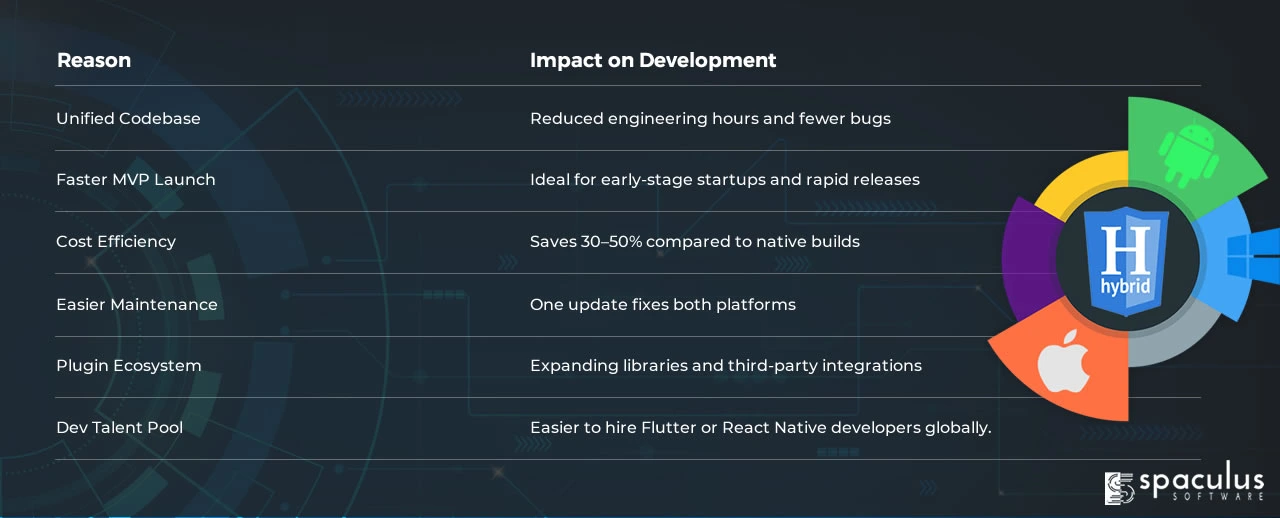
| Reason | Impact on Development |
| Unified Codebase | Reduced engineering hours and fewer bugs |
| Faster MVP Launch | Ideal for early-stage startups and rapid releases |
| Cost Efficiency | Saves 30–50% compared to native builds |
| Easier Maintenance | One update fixes both platforms |
| Plugin Ecosystem | Expanding libraries and third-party integrations |
| Dev Talent Pool | Easier to hire Flutter or React Native developers globally. |
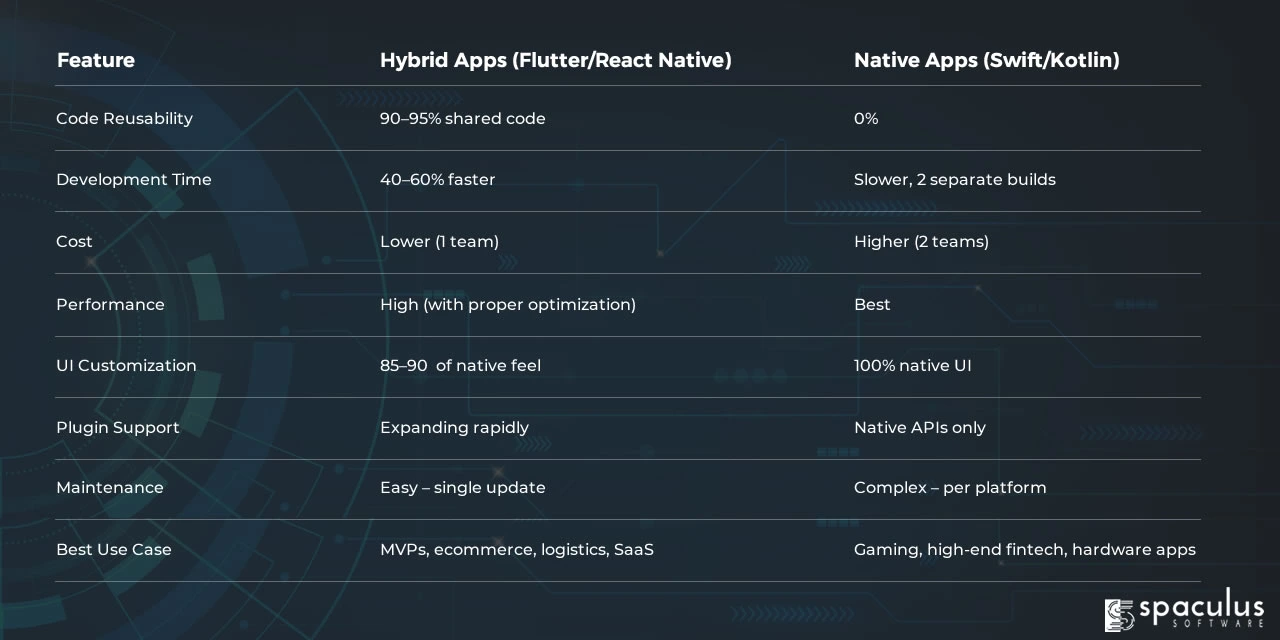
| Feature | Hybrid Apps (Flutter/React Native) | Native Apps (Swift/Kotlin) |
| Code Reusability | 90–95% shared code | 0% |
| Development Time | 40–60% faster | Slower, 2 separate builds |
| Cost | Lower (1 team) | Higher (2 teams) |
| Performance | High (with proper optimization) | Best |
| UI Customization | 85–90 of native feel | 100% native UI |
| Plugin Support | Expanding rapidly | Native APIs only |
| Maintenance | Easy – single update | Complex – per platform |
| Best Use Case | MVPs, ecommerce, logistics, SaaS | Gaming, high-end fintech, hardware apps |
Most product failures don’t happen because of bad ideas.
They happen because of poor execution.
Hiring a low-cost or inexperienced hybrid app company can lead to:
In short — cheap now, expensive later.
Today’s tech leaders are smarter about their hiring decisions.
They’re not just looking for “developers.”
They want engineering partners who think long-term.
Here’s what they’re actually evaluating:
Your partner should not just “use” Flutter or React Native — they should understand:
Ask them:
“Have you built native plugins for hybrid stacks?”
If not — that’s a risk.
Every serious app in 2025 ships with:
If the team still builds and tests manually — walk away.
A good partner will:
Scalability begins with code clarity.
In 2025, real-time collaboration isn’t a luxury — it’s a requirement.
You should be able to:
This transparency builds trust.
90% of app issues arise after launch.
Your partner should have a clear SLA for:
A partner who disappears after handover is a liability — not an asset.
To filter great partners from average ones, ask these:
| Question | Why It Matters |
| What’s your CI/CD process from commit to production release? | Ensures deployment isn’t manual or error-prone |
| How do you manage code versioning and branching across teams? | Reveals engineering discipline and team scalability |
| What testing frameworks do you use for unit, UI, and regression tests? | Indicates how seriously they take quality and post-launch stability |
| Have you built or integrated native plugins for iOS/Android in hybrid apps? | Critical for third-party SDKs, device APIs, and performance optimization |
| How do you monitor performance and crashes after release? | Firebase, Sentry, or custom logs — shows commitment to ongoing support |
| How do you handle OS version updates (e.g., iOS 18, Android 15)? | Verifies long-term maintenance strategy |
| Can we see real user metrics (retention, crash-free rate, app store ratings) from a recent build? | Adds credibility to their performance claims |
| How do you structure handover and documentation for internal tech teams? | Ensures clean transitions, especially if scaling or switching vendors |
| What’s your typical sprint cycle and how do we get visibility? | Determines clarity in communication and execution pace |
| How do you manage scope changes during the project? | Reveals their flexibility and planning ability |
| What’s your SLA for critical bug fixes post-launch? | Slack, Notion, Jira, etc. ensure transparency and speed |
| What tools do you use for real-time communication and task tracking? | Slack, Notion, Jira, etc. ensure transparency and speed |
| How do you ensure your hybrid architecture scales past 100K users? | Determines if their code can evolve with your product’s growth |
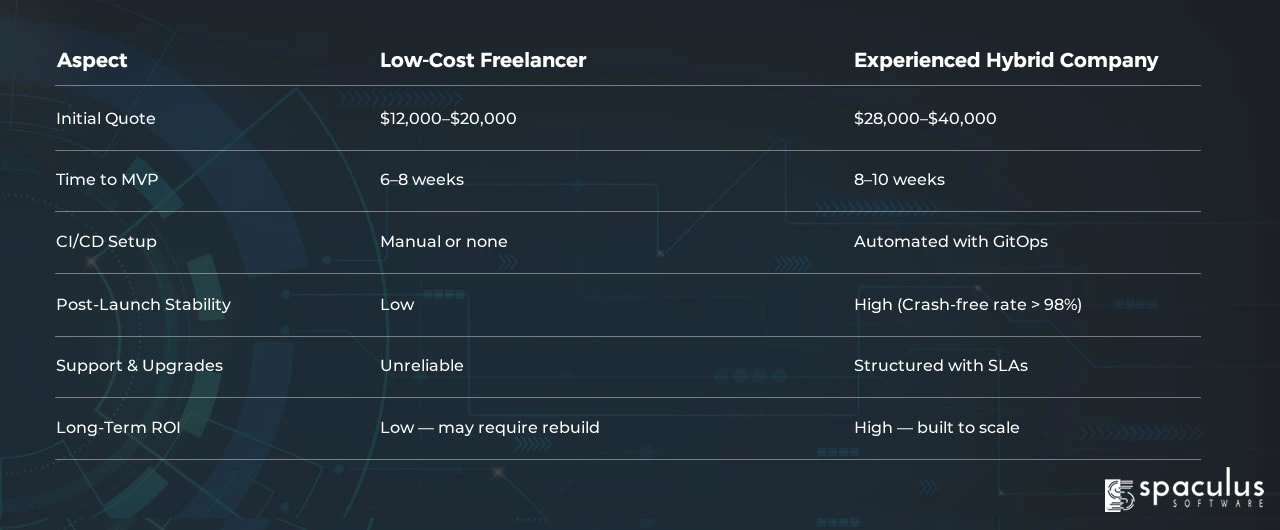
| Aspect | Low-Cost Freelancer | Experienced Hybrid Company |
| Initial Quote | $12,000–$20,000 | $28,000–$40,000 |
| Time to MVP | 6–8 weeks | 8–10 weeks |
| CI/CD Setup | Manual or none | Automated with GitOps |
| Post-Launch Stability | Low | High (Crash-free rate > 98%) |
| Support & Upgrades | Unreliable | Structured with SLAs |
| Long-Term ROI | Low — may require rebuild | High — built to scale |
The upfront cost difference is often recovered within 3 months via fewer bugs, faster iterations, and better retention.
Here’s a practical checklist you can use:
✅ Do they have 3+ years of hybrid development experience?
✅ Can they show real metrics (crash rate, app ratings, user growth)?
✅ Is their team skilled in DevOps, QA, and native bridging?
✅ Do they offer structured post-launch support?
✅ Can they align with your internal tech team and tools?
If the answer is “no” to even 2 of these — keep looking.
Not every project needs hybrid. But if your business falls into one of these — hybrid is likely the best move.
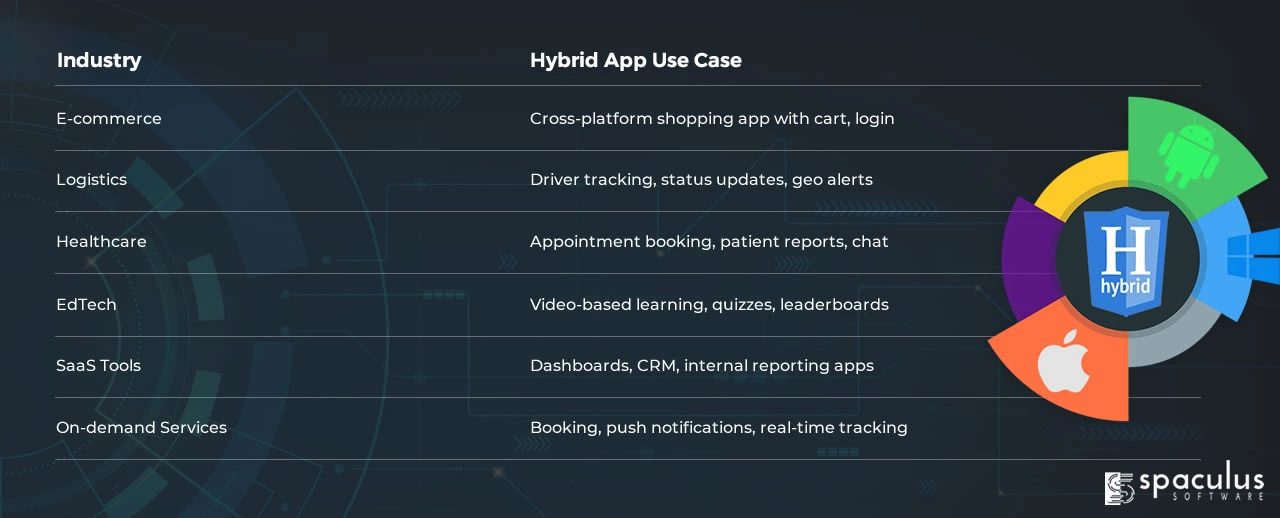
| Industry | Hybrid App Use Case |
| E-commerce | Cross-platform shopping app with cart, login |
| Logistics | Driver tracking, status updates, geo alerts |
| Healthcare | Appointment booking, patient reports, chat |
| EdTech | Video-based learning, quizzes, leaderboards |
| SaaS Tools | Dashboards, CRM, internal reporting apps |
| On-demand Services | Booking, push notifications, real-time tracking |
At Spaculus Software, we help ambitious companies launch hybrid apps that don’t just work — they win.
✔️ Flutter & React Native specialists
✔️ Integrated DevOps, CI/CD & test automation
✔️ Design systems that scale
✔️ Backend + mobile synergy
✔️ Transparent project tracking
✔️ Post-launch support that actually supports
📩 Book a free 30-min discovery call with our CTO.
Let’s review your goals, architecture, and risks — together.